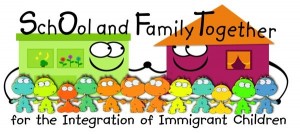
For most families moving to the UK, the first communities they come into contact with are their children’s schools. But becoming a part of the school community can be a challenge.
The Gathered Together project (run by BEMIS, a body supporting the development of Scotland’s ethnic minorities voluntary sector, and the Scottish Parent Teacher Council) works with parents from ethnic minorities to get them more involved with their schools and with their children’s learning.
Says Lorraine Dougan, head teacher at Golfhill primary in Glasgow, where over a third of the pupils don’t have English as a first language.: “Parents who speak little English are often less confident about coming into the school, which means that they tend not to come to parents’ nights, school events . . . and this means they are missing out on really important aspects of their child’s learning and being part of that wider school community.”
In Gathered Together’s conversations with parents, language, confidence and lack of information come up time and time again as barriers stopping them taking a more active role in their children’s school.
When you’re not confident in you language even the simplest contact with school can be stressful. We met one mum who spoke about how difficult it was for her to phone the school to say her child was sick.
The Scottish education system is also different from other cultures. Many countries have regular tests so that parents know where their child stands in relation to their classmates, and some parents find it disconcerting that this is not the practice in Scotland.
There’s a real need to engage with parents who are new to Scotland so that they understand how their children are being taught and how to support them- and reassure them that their children are learning. In an effort to engage with the parents who speak English as an additional language (EAL), Marilyn Gordon, Golfhill’s EAL teacher, started a “learning together club”. This group gives parents the chance to work with their children, see how they are being taught and learn ways of supporting their children’s learning.
Gordon says that when parents came to school and worked with her, “the confidence levels of the children just were obviously going up and up and up. The expression on their faces when they knew that their parent had come into school to work with them – they were absolutely delighted.
“It shows that the parents and teacher are working together and the children could see that the parents were part of the school life, that it was a place for families and not just for children.”
Getting parents involved in their children’s school has a massive impact on the whole family. One parent talked to us about the challenges posed by her children growing up in a culture different from her own and how getting involved in the school helped bridge that gap and gave her an understanding of the world her sons were living in.
Another mother at Wynford Nursery in Maryhill said that getting involved in a parents group run by the nursery helped her feel less isolated by giving her the chance to make friends with other parents, find out about local clubs and services – it gave her a sense of belonging.
Maria, a parent at Golfhill Primary, is originally from Bulgaria and is now firmly part of the school community, and is involved in the Families in Partnership Programme and the Parent Council. She’s incredibly positive about the importance of getting involved: “To be involved in the school here makes a big difference for my daughter because she sees me in school, she sees that I’m taking part in the Parent Council and she’s really proud.
“She says, ‘Oh, this is my mum, she’s doing this and that in school’. I know the teachers very well and I can have a chat with them anytime- so it’s like a small family- the school is my family”
Taken from an article on Gathered Together from Migrant Voice http://www.migrantvoice.org/voices/pagenews/the-gathered-together-project.html
I met up with Mary Pat MacConnell, the Head of Wyndford Nursery in Glasgow and Rose Filippi from Maryhill Integration Network to find out more about the project that had been run at the nursery. Gathered Together are always looking for examples of good practice and we had heard that Wyndford nursery was a shining example of involving parents.
Wyndford Nursery is in the North of Glasgow in a housing estate, it is one of the areas in Glasgow with a high population of asylum seekers and refugees and there are a lot of languages spoken by the families who use the nursery. Many of the families are very socially isolated when they arrive, not knowing anyone or where to go to ask for help. Mary Pat described the “Well Chosen Words” project as being born out of “desperation”. One mother was really anxious about asking to take her child out of nursery early to allow him to go to a doctor’s appointment- she didn’t know how to ask this and the nursery was able to help her with literally finding the right words. This incident highlighted a need among the parents who had English as another language.
As Rose explained:
Wyndford Nursery partnered up with Maryhill Integration Network (MIN) to help develop the Well Chosen Words project. MIN is a charitable organisation that has been working to support social integration in the local community for over ten years. Working in partnership with MIN has supported the project via the staff skills and knowledge of engaging with communities from various backgrounds in a sensitive and informed way, harnessing the unique and valuable cultural richness they offer, and finding ways in which to share this with the wider community
Well Chosen Words is a project that engages parents with EAL needs in planning a framework for dialogue that will support their communication needs with regards to their child’s attendance at nursery, further engagement within the community, and ongoing development in education and learning. The project aims to engage parents to play a creative role in the development of support services and material available for parents with EAL needs.
The impact it’s made on the parents has been tremendous, helping them build confidence and support each other. The support in helping to get to know the local area and services has been really valuable, here are two parents- Mathieu and Naomi- talking about how the project has helped them and their families
For more interview with parents click here
We are working with a lot of organisations, sharing our experiences and looking for ways we can work together to support Ethnic Minority families become part of their school communities. Martha from SOFT has kindly written us a guest blog about the work that they are doing to help immigrant families

The SOFT project aims to foster the linguistic and social integration of migrant children through shared language learning activities that involve teachers, families and children.
SOFT- is a language project funded by the European Union EACEA/Lifelong Learning Programme and involves several countries (Spain, Germany, Switzerland, Scotland and Italy). There are currently 6 schools and nurseries taking part in Edinburgh, involving 576 children and 29 teachers. The schools involved in our city are: Fort Early Learning Centre, St Mary’s RC Primary, Castleview, Niddrie Mill, St David’s and Tollcross Primaries.
The Language activities are based on the Narrative Format approach of language learning, also known as the “Hocus & Lotus” method used previously in several EU projects. Children learn languages through telling stories, whilst acting them out, singing or drawing. The most important aim of this project is to raise awareness of the advantages of early language learning in benefiting cognitive and literacy development, and it is also a fun activity to do in the class with friends and feel valued. This fosters positive attitudes towards intercultural communication and multilingualism, facilitates the use of cooperative and collaborative learning practices in class and enhances home-school relationships.
For more information visit their website http://www.softintegration.eu/index.php/en/soft-project or http://www.bilingualism-matters.ppls.ed.ac.uk/projects/soft-2/
Gathered Together has been running for seventeen months now and we thought the end of the year would be a good time to look back at what we’ve done over the year. Here are a few figures-
35 workshops for ethnic minority parents, reaching 358 parents
22 training sessions for Parent Councils reaching 257 parent council members and head teachers
10 videos on our website with parents, head teachers and key stake holders sharing good practice (and more videos to follow in the New Year)
Our workshops with Ethnic Minority parents have been a wonderful opportunity to find out about the experiences of parents in relation to their children’s schools. It’s helped highlight good practice with some great stories of how schools engage with parents and help them feel a part of the school community as well as helping us to understand the barriers that parents can face. The biggest barrier for the majority of Ethnic Minority parents face is language and we’ve been able to do simple things like make parents aware of their right to get an interpreter for meetings with school as well as share ideas for how they can get involved despite the language barrier. We’ve also raised awareness about parents’ rights to get involved and have their voice heard within the school. So many of the parents at our sessions hadn’t heard of the Parent Council or had only the vaguest idea of what they do and we’ve been able to raise awareness of the work Parent Councils can do and the impact they can have on the ethos of the school.
We’ve been able to take the barriers and experiences we’ve heard from our EM sessions to pass on to local authorities and feed into our training for parent councils. The training is meant to give parent councils the chance to think about the experience of parents who experience barriers and challenge them to come with practical solutions to help overcome these barriers. This is often a rare opportunity for parent councils to come together, share ideas and talk about their experiences. The time and space to think about participation and what they can do to help parents become more involve is incredibly valuable and some brilliant ideas have come out of these discussions. The training is also an opportunity for us to share the good practice we’ve come across including community assemblies, newsletters as podcasts, meeting new parents when their children is transitioning and international days. The parents who came along to the training have feedback that it’s made them aware of the diversity within the school. One mother said that she just found out one of her daughter’s best friends was Polish and that the school has a sizeable Eastern European population she hadn’t been aware of.
One of the best parts of our work has been gathering the stories of the people who are supporting parental involvement. We have met some inspirational people including ethnic minority parents who are taking an active role in their children’s schools, teachers who passionately believe in working in partnership and parents sharing the challenges they’ve experienced in getting involved in their children’s education. Being able to record the interviews has been fantastic so that people can hear about these experiences in their own words. If you haven’t already go have a look- http://gatheredtogether.bemis.org.uk/?p=538 and let us know what your favourite videos are.
Don McPherson- Head Teacher Denny Primary School